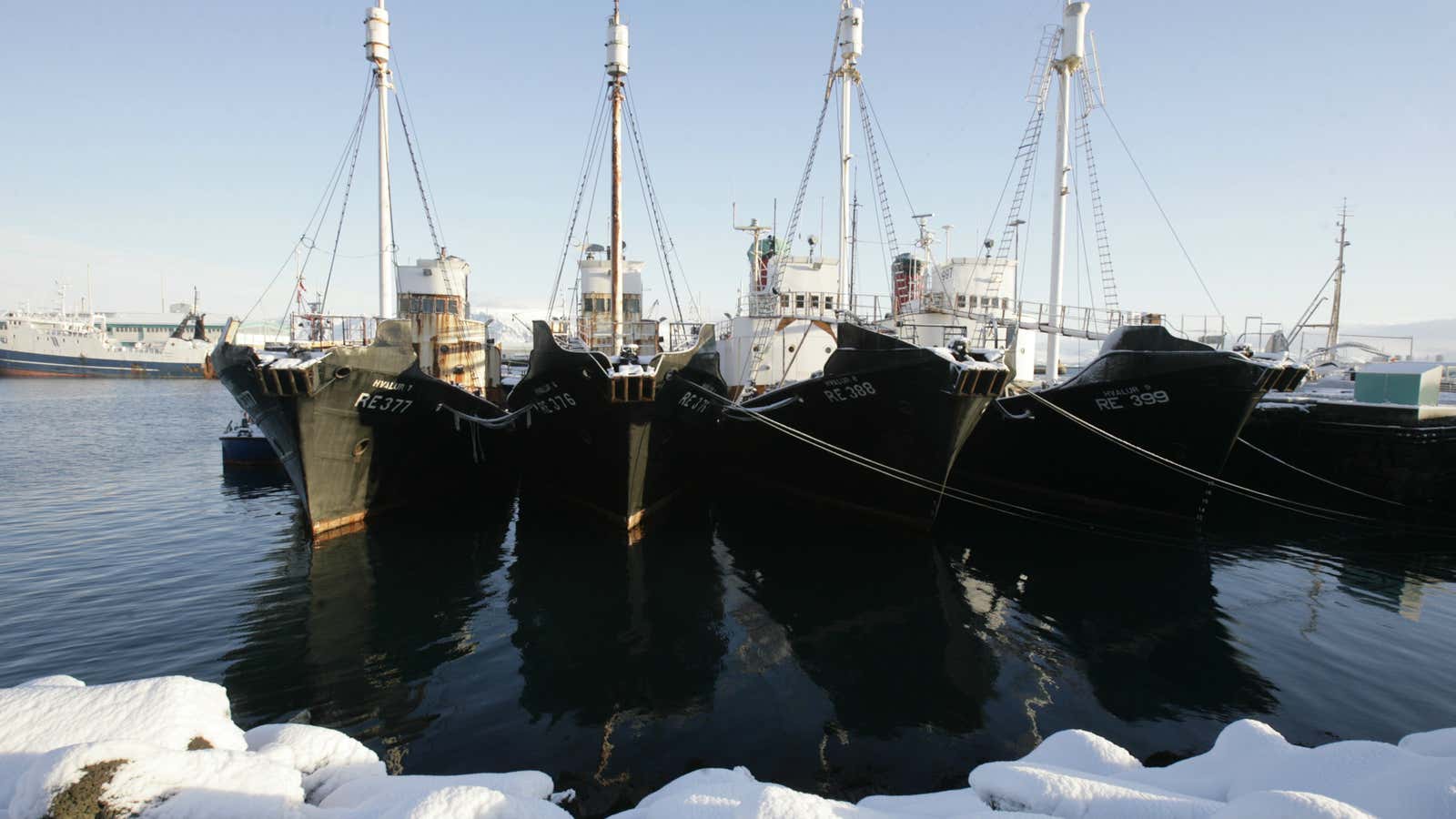Whaling will continue in Iceland for another five years, per new quotas released by the government last week, and the tourism industry is not happy about it.
Tourism has seen unprecedented growth in Iceland since 2010, and now accounts for more than 8% of Iceland’s GDP. In 2016, revenue from tourism (paywall) outstripped that of fisheries for the first time. With signs that this meteoric growth has started to stabilize (pdf), it’s understandable that officials would resist any policies that might slow growth any further.
Iceland’s “market for whale meat is Japan, Norway and the Republic of Palau,” the Icelandic Travel Industry Association, a consortium of tourism businesses, said in a statement responding to the extension of the quotas. “Our market is the entire globe.”
Iceland is only one of two nations that permits commercial whaling in defiance of a 1986 moratorium from the International Whaling Commission (the other is Norway; though Japan is due to restart later this year). International pressure to cease the practice has been present for years. After last week’s decision, the AP quoted politician Bjarkey Gunnarsdottir as saying, “We risk damaging the tourism sector, our most important industry.”
The issue of whaling in Iceland touches on an interesting question in the age of overtourism. As governments try to balance the needs and desires of locals with those of ever-increasing visitors, should nations stop doing something just because it hurts tourism? There is, after all, a “carrying capacity” for countries reliant on tourism, according to overtourism expert Elizabeth Becker, so building your entire economy around them may be unwise. Forward-thinking nations, as Becker previously told Quartz, are vying to attract the kind of “lower impact, higher value” traveler that will be good for the economy without being a total drain on resources.
But unlike some other industries, whaling isn’t just a question of economics. International sentiment is broadly against the practice, and charismatic megafauna like whales have long been known to hold symbolic value for conservation. The question of its value is also hardly settled in Iceland itself. One poll testing public sentiment about whaling in Iceland, conducted in 2017 by the International Fund for Animal Welfare, found that 35.4% of Icelanders surveyed supported whale hunting, down from 42% in 2016. Other polls suggest that a significant chunk of the nation doesn’t have a strong feeling either way. And a study from the University of Iceland’s Institute of Economic Studies released in January, which found that whaling is economically beneficial to the country and doesn’t have a negative effect on tourism, was heavily criticized by local conservationists.
The Icelandic Travel Industry Association is worried that the practice will drive away the types of highly motivated, high-spending tourists that the country is most keen to attract. Managing director Jóhannes Skúlason says while hard data of the effect on tourism is scant, “for the last five years we have had indications that whaling does have an effect on the public opinion and thus on tourism to Iceland.” Some of those indicators come from feedback provided by tourism companies and travel agencies, specifically those that run or book whale-watching trips for visitors.
“We’ve been pointing out that the tourist doesn’t just appear on the deck of the whale watching boat,” Skulason told Quartz. “The tourist goes through a long period of planning his vacation, where he wants to go and do, and there are a lot of things that affect that decision—news of Icelandic whaling can be one of these influencing factors.”
Then, of course there are incidents where the tourists who come to spot humpbacks and minke whales run into ships hauling newly-killed whales. Not exactly what they signed up for.
The Icelandic government, meanwhile, seems unperturbed. It states on its website that “whaling in Icelandic waters is only directed at abundant whale stocks, North Atlantic common minke whales and fin whales, it is science-based, sustainable, strictly managed and in accordance with international law.” Whether that explanation is enough for international tourists is still to be seen.
